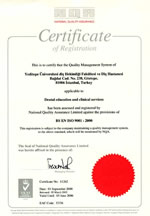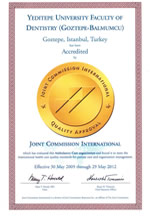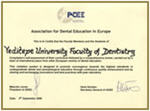Quality Certificates
1. ISO-9001 (International Standard Organization)


- It is patient-oriented, attaches importance to employee participation, adopts a process approach, aims for continuous improvement, does not depart from realistic and ethical approaches in decision-making processes, and considers mutual benefit in all supplier and other stakeholder relations.
- It provides planned and systematic working conditions within the organization.
- Creates the necessary working conditions for the continuity and improvement of the targeted quality.
- It ensures traceability of activities and accessibility to retrospective studies.
- It provides the opportunity to obtain perfect service by fulfilling the requirements such as quality plans, process control, inspection, test and calibration.
- Saves cost and time.
- Reduces patient complaints.
- Increases profitability and efficiency.
- Provides effective management.
2. JCI (Joint Commission International)

The purpose of this accreditation, which our hospital voluntarily applied for, is a compliance certificate that it has international health management standards and aims to increase its development gradually.
Objectives
- Improving quality
- Reducing costs
- Increase efficiency
- Increasing the credibility of the institution and strengthening its image
- Improving the management of health services
- Provide training
- Increase job satisfaction
- Ensure impartial measurement and evaluation
3. ADEE (Association of Dental Education in Europe)

On 16.01.2008, it was audited and certified that the education provided by our Faculty is at European standards.
The aim of the European Association for Dental Education is to achieve the highest standards of education in dentistry, to improve all implementation and supervision methods, to enable educators and students to take part in exchange programs and to measure the benefits obtained from the process.
4. European Federation of Periodontology - EFP
02.11.2005 is the accreditation received in postgraduate education.
Its aim is to improve periodontal health in Europe, to develop and maximize periodontology education and to ensure unity between countries.
Founded in 1991, the European Federation of Periodontology includes the following countries: Austria, Belgium, Switzerland, Czech Republic, Czech Republic, Germany, Denmark, France, Greece, Hungary, Italy, Ireland, Israel, Israel, Netherlands, Portugal, Poland, Finland, Slovenia, Great Britain, Norway, Slovenia, Spain, Sweden.
